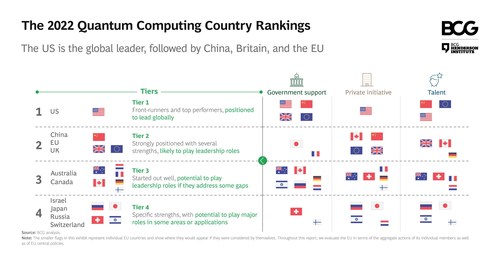- BCG Estimates That Quantum Computing Could Create From $450 to $850 Billion of Value in Next 15 to 30 Years
- Europe Is Currently Among Leaders Globally in Terms of Public Support and Fundamental Research, but Lacks Member State Coordination, Sufficient Private Capital, and a Talent Pipeline to Capitalize On
- Lessons From the Semiconductor Industry Need to Be Learned to Scale Capability and Protect European Quantum Sovereignty
PARIS, Aug. 25, 2022 /PRNewswire/ — Investments in quantum reached all-time record highs in 2021 and are predicted to continue rising significantly, with multiple existing industries set to benefit and new industries likely to be created. Boston Consulting Group (BCG), one of the world’s leading management consulting firms, today published new research highlighting the scale and pace of global quantum computing, titled, Can Europe Catch Up With the US (and China) in Quantum Computing?
While the US is a clear frontrunner on quantum computing patents, venture capital, and volume of talent, the BCG report finds that the EU currently leads the way in terms of public investment. However, the EU lacks a coherent plan of action to coordinate individual Member State activities, has an underdeveloped private capital market prepared to invest in late-stage quantum businesses, and is not developing sufficient quantum computing talent to meet anticipated demand. BCG’s report highlights that the US currently has between two and three times more quantum talent in the business world than does the EU.
Without urgent action, the report shows, the EU risks repeating mistakes made in the semiconductor industry. Europe, together with the UK and China, is currently well-positioned in a trio of pursuers that are chasing the US (see exhibit). The EU is among leaders in public action in quantum and has put in place plans such as the Quantum Flagship, coordinating research efforts across multiple industries, and running pilot educational projects to give a direction to the developing ecosystem.
So what does the EU need to do to avoid repeating the mistakes it made more than a decade ago in failing to scale a continental semiconductor industry?
“The EU has all the ingredients needed to succeed in the quantum race but needs to rapidly develop and deliver a comprehensive plan to turn potential into action,” says François Candelon, a managing director and senior partner at BCG, and coauthor of the report. “Europe’s history when dealing with tech revolutions has too often been characterized by early promise, failure to scale at critical moments, and then an expensive attempt to catch up. Policymakers need to learn those lessons fast. The good news is that the window is still open to create and execute a European strategy, building public and private capital powerhouses to invest in and scale European universities’ ability to train the next generation of quantum experts.”
An Action Plan for Europe
BCG’s report maps an action plan for Europe to maintain quantum sovereignty:
- First, create an integrated EU-wide action plan that aligns Member State programs and strategies.
- Second, close the European investment gap, particularly for late-stage funding, to allow European start-ups to scale quickly.
- Third, build an end-to-end talent pipeline from high school to post-graduate to create enough talent to meet surging business demand.
Quantum Sovereignty
The COVID-19 crisis highlighted Europe’s capability to design and manufacture at scale new vaccines that proved essential to controlling the impact of the pandemic on the continent. Conversely, the lack of in-house European manufacturing capabilities for advanced semiconductors showed its dependence on a global supply chain. According to BCG estimates, the chip crisis prevented the production of around 10 million vehicles, which was particularly impactful for Europe, home to major automobile manufacturers.
Quantum will impact multiple industries central to a country’s competitiveness and sovereignty such as aerospace, defense, pharma, and chemicals. If Europe wants to maintain its global relevance as well as self-sufficiency in key economic areas, it must ensure access and master quantum capabilities in all stages of the supply chain, from R&D to manufacturing and end applications.
Download the publication here: https://www.bcg.com/publications/2022/can-europe-catch-up-in-quantum-computer-race
For more information, please contact Brian Bannister at +44 7919 393753 or [email protected].
About Boston Consulting Group
Boston Consulting Group partners with leaders in business and society to tackle their most important challenges and capture their greatest opportunities. BCG was the pioneer in business strategy when it was founded in 1963. Today, we work closely with clients to embrace a transformational approach aimed at benefiting all stakeholders—empowering organizations to grow, build sustainable competitive advantage, and drive positive societal impact.
Our diverse, global teams bring deep industry and functional expertise and a range of perspectives that question the status quo and spark change. BCG delivers solutions through leading-edge management consulting, technology and design, and corporate and digital ventures. We work in a uniquely collaborative model across the firm and throughout all levels of the client organization, fueled by the goal of helping our clients thrive and enabling them to make the world a better place.
SOURCE Boston Consulting Group (BCG)






















